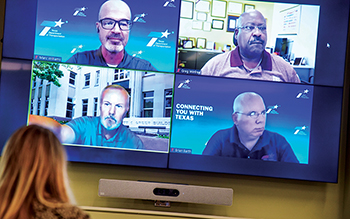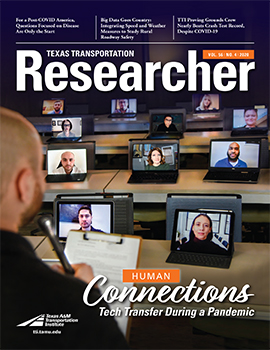The Texas A&M Transportation Institute (TTI) hosted the Ninety Fourth Annual Transportation Short Course Oct. 12–14, 2020. Traditionally held in person at Texas A&M University in College Station, Texas, travel restrictions and concerns for personal health in the era of COVID-19 forced planners to hold the event online for the first time in its near-century history.
“Not holding it was never an option,” explains Director of Administration Mary Cearley, who organizes and oversees the event for TTI. “While we’d obviously prefer to hold it in person, Short Course is about sharing information to benefit everyone who uses our state transportation system. Going virtual gave us an opportunity to reach more people, which can only help further that mission.”
A record 4,207 attendees registered for the event, up approximately 34 percent from last year’s then-record attendance. Sponsored by the Texas Department of Transportation (TxDOT), Short Course gives transportation practitioners and researchers a common forum to discuss the latest innovations in transportation technology, methodology and application. Transportation system improvements — whether they be longer-lasting roads, improved urban mobility, or safer roadway designs aimed at saving lives — ultimately benefit everyone who uses the Texas transportation network every day. Sessions covered such topics as traffic operations, maintenance, construction, design, planning, structures and the environment, among others.
TTI Agency Director Greg Winfree welcomed attendees from the traditional site of Short Course’s opening session, Rudder Auditorium on the Texas A&M campus. His address emphasized the historic relationship between TTI and TxDOT, a partnership forged in 1950 when the then-Texas Highway Department sought the expertise of Texas A&M civil engineering professors to improve the state’s roadway network. That partnership soon expanded to include other universities and other travel modes and is now the envy of the nation.
“TxDOT and the state universities have laid a solid foundation of trust and teamwork over seven decades — marked this year,” Winfree noted proudly. “Seventy years gives new meaning to a long-term partnership.… Now we are entrusted to keep it vibrant and strong for the next 70 years.”
Though the auditorium was empty as Winfree streamed his speech, having him speak to attendees from Rudder Auditorium was a conscious decision that planners made. Keeping Short Course traditions like that was a strategy for making the transition to an online venue just a little more comfortable. Other examples of familiar rituals included having the Texas A&M Corps of Cadets present the colors and provide the invocation, and showing a flyover of the A&M campus.
Another tradition and one of the proudest moments at Short Course is when TxDOT honors its best and bravest. Each year, two sets of awards are bestowed that uniquely recognize individual excellence in serving Texans. The Big Five Awards, named for giants in Texas transportation history, are presented to individuals showing outstanding leadership and dedication to TxDOT. The Extra Mile Awards recognize TxDOT employees who helped save a life or prevent a life-threatening situation from occurring, qualifications that gained extra significance during the 2020 pandemic.
“Congratulations to our award winners… you do us all proud,” said TxDOT Executive Director James Bass. “Not even the challenges of 2020 — and we’ve had a few — could stop our mission: connecting you with Texas.”
That theme for this year’s Short Course, “connecting you with Texas,” could not have been timelier. Social distancing, quarantine and travel restrictions have made it more challenging for practitioners and researchers to communicate with one another, illustrating up the vital importance of keeping events like Short Course alive. Taking the gathering virtual not only met a practical need but also facilitated information exchange and technology transfer by keeping the lines of communication open and encouraging even more folks to take part. Robust interactions between presenters and attendees through each session’s virtual Q&A was a testament to the effectiveness of this year’s event. In the end, it’s Texans who travel and visitors to the Lone Star State who will benefit most from that investment.
Looking forward, Winfree noted how the world has changed this year. The transportation research agenda has changed as a result, and he emphasized the need to look beyond traditional focus areas and account for new, microscopic threats to system users.
“As we evolve our research agenda, our ingenuity must now also address the harder-to-see hazards on our steering wheels, bus handrails and airline seats,” Winfree said. “We must redefine the concept of individual safety beyond safety belts and airbags to also include the public health impacts on our shared transportation environment.”
Next year’s Ninety Fifth Annual Transportation Short Course is planned for Oct. 11–13, 2021.

